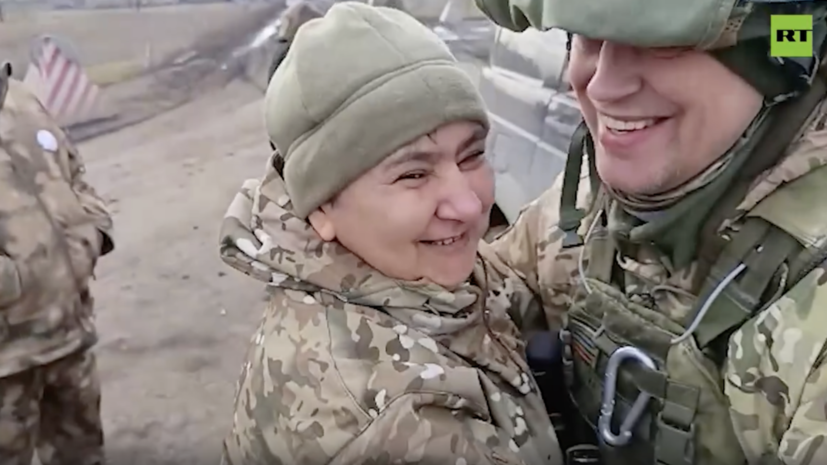“Aunt Marin! Aunt Marin! - a bearded man desperately shouts from the car. The car door slams, and a tall fighter in camouflage with a body kit, smiling, runs towards 60-year-old Marina Pogosyan, the founder and leader of “We are strong together.”
This happens almost the entire way of a small “convoy” with cargo from Niva and KamAZ to the front. The soldiers and officers for a long time did not let go of both Marina Pogosyan and Gennady Mirny - the entire small crew of the humanitarian convoy. They walk around hugging each other for a while before starting to sort out the gifts from the rear.
The movement began with sending parcels to those mobilized from their region, in this case Kuban. “Our guys are like that, they will never fight in the same snout. They will always share what they receive. So, we need to bring more. Then some were sent to other units or, conversely, others were transferred to our boys. In general, there were more and more children and grandchildren,” says Marina Pogosyan.
She calls her charges “grandchildren”, “children” or “candy children”. At the next stop, the “candy kids” - mechanic drivers and gunners of combat vehicles, riflemen and sappers - quickly unload the truck. A stove, blankets, and boxes of food can be placed in the trunk of the “loaf” with lightning speed. Marina explains where everything is and what is intended for whom, and in addition hands over a box of homemade pies.
RT
Aunt Marina's caravan is heading to the next point. On the road, Poghosyan tells how other “candy children”, to whom she also brings pies, fought back for several days, being semi-surrounded: “The neighbors wavered, moved away a little. But our boys didn’t lose a meter. There wasn’t even such a thought.”
The pies also go to the regiment commander - the orderly, quickly assembling the units on the table for the headquarters, places them in the center of the table. Marina listens to her boys fight. The officers, explaining, draw on the oilcloth with the handle of a fork the lines of positions, directions of attacks and counterattacks: “We came from here... flanking fire... went from the other side...” “You need heights, there’s nothing to do in the lowlands,” Marina nods and immediately switches to supply and kitchen issues. — There’s a tomato in a jar, cook some borscht. Should I give you some pepper? Although what I’m asking is, of course, to wind it up.”
“Finally, we saw each other in person,” - at the next stop of the “convoy” Marina hugs the tightly built soldier. “We’ve been corresponding for six months,” he smiles enthusiastically in response.
Pogosyan knows everything about her wards “grandchildren”: hometown, clothing sizes, shoes, food preferences and can list this information even if she is woken up in the middle of the night.
"All ours"
Despite the pies, pancakes and “candy babies,” Marina barely fits into the image of a kind grandmother. It's not just about the constant cigarette and camouflage. He speaks straight to the point and demands what is necessary strictly - this is reflected in his many years of experience in business. Part of the funds from the gardening of Poghosyan and her children goes to humanitarian work.
“Albertik, the eldest son, will sell the seedlings and say: there are so many. I told him: “Well, I’ll take half of it to my fighters,” says RT’s interlocutor. - Or maybe my guys have come up with something to do - plant potatoes. I say: "Let's go!" And I laugh myself. They are at a loss, they say, what’s funny. Yes, I say, I’m glad that my boys will be with potatoes all summer. Who will you sell potatoes to in the village? In the end, they collected her and sent her to the front.”
RT
And humanitarian work in the front line is not at all the kind of activity where you can be soft. “For example, wives are tempted to put a bottle in the parcel going to the front,” says Gennady Mirny. “They say it’s to help relieve stress, but some people don’t know any other entertainment.”
But Aunt Marina is adamant on this issue. “I told everyone: not to have a single bottle! And one of them tells me: “I drove, I carry and I will carry!” I told her: “Okay, I took the boxes and left my yard! Do you want to wait for your husband alive? And what about others, you fool, did you think about?” - she gets angry, remembering that incident.
The strong character of RT’s interlocutor was shaped by the events of her youth. In the early 2000s, the North Caucasus, with which Kuban borders, was a region at war. Marina was taken hostage in the then troubled Chechnya. She turned out to be an accident, she was confused with a relative of a rich man, but then she got out of captivity herself and helped others get out, Poghosyan calmly recalls that story.
With all its ardent, even fanatical love for its native land, pride in its boys who fight as they should - desperately and bravely, for “We are strong together” it makes no difference who to help. “All of ours are Krasnodar, Stavropol territories, Tula, Rostov, Moscow, Dagestan. And all Russians. They are fighting for the Motherland, for Russia, for Mother Rus',” Marina explains the simple principles of her movement.

